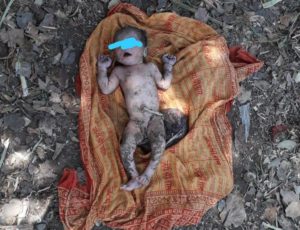Experts caution against rise in child trafficking post lockdown

The one and a half month old girl child that was found abandoned in Ahmednagar district is now being treated in a hospital and would be handed over to Snehalaya upon recovery (Photo courtesy: Snehalaya)
While the focus of coronavirus coverage has been on the doctors, patients, migrant workers and the lot, children in India, especially from disadvantaged backgrounds, face dangers of a different order.
A week ago, when Spain relaxed its lockdown, one of the main images portrayed Spanish children who were allowed to play outside their homes for the first time in over a month. Indeed, the biggest drawback of the lockdown for kids in Spain and most European countries hit by Coronavirus pandemic was the fact of them being locked indoors, far from their friends and schools.
Unfortunately, only a privileged child in India would have the same problems as a result of the lockdown, but for a large majority, coronavirus and the lockdown poses much more serious and often existential dangers.
In just one week, there have been three cases of children being abandoned or parents seeking to give away their children in Ahmednagar district of Maharashtra. The history and the reason for abandonment of children in each case may be different and seemingly unrelated, but to the trained eyes of an expert who has spent over four decades working to help the most disadvantaged children, it spells a dangerous pattern.
“Two days ago, we had received a message about the family wanting to relinquish one of the twin daughters as they would not be able to support them both as the children’s father had been out of a job for the past 45 days. We first offered to help the family financially as it is always better for the children to stay with their biological parents, but the children’s mother was worried that over the long term, they would not be able to take care properly of both the girls and hence insisted on giving one away. Then we began preparing all the documentation for the relinquishment of the child, but suddenly the family changed its stance. We could not figure out the reason behind them changing their mind. We are worried that may be the family was approached by another family looking to adopt the child but due to the long waiting list, currently over three years in India, and the fact that all adoptions have been banned by the government in view of the covid crisis, the twin girls’ family may have been offered some financial incentive to part with the child,” says Girish Kulkarni, founder, Snehalaya, one of the largest NGOs in Ahmednagar that mainly works with HIV+ female sex workers and their children.
There have been two more cases of children being abandoned in the district in the past week and both are currently hospitalised as they had been abandoned for a while. “As the children were nearly two months old, I feel that they were abandoned for economic reasons. We will know the truth only when we find their parents, but this fear is very much there in our minds,” says Kulkarni, who raises alarm about an important issue which has been completely neglected by the media and government equally.
Child trafficking alert
Kulkarni feels that as soon as the lockdown is lifted a large number of social issues concerning children such as child marriages, child trafficking, rise in children being used for begging or employing child labour as well as incidents of child abuse will increase.
India has the dubious distinction of having one of the largest numbers of child trafficking incidents. The United Nations Office Drugs & Crimes rates South Asia as a hotspot for child trafficking with 99 pc of cases being for sexual or labour purposes. NCRB data shows that in 2016, 9034 children, below 18 years, were trafficked. Of these, 4,911 (54 pc) were girls and 4,123 (46 pc) were boys. Experts believe the actual numbers are far higher as not every case gets registered.

Founder of Snehalaya, Girish Kulkarni, feels that child trafficking will rise sharply in India once the lockdown is lifted
“The cases of abandonment may be isolated incidents today, but I am very worried that child trafficking would rise sharply as soon as the lockdown is lifted because far too many families would find themselves in the same situation where they would be unable to fend for their children and would either like to relinquish them for the children’s betterment or even sell a child to make some money for the remaining children in the family.”
The streets without children
In most large cities of India, two sightings are so common that they are synonymous with street life in the country – cattle and children. India is home to millions of street children, most of them either abandoned by their parents or guardians or those who have run away from home. However, ever since the lockdown began, streets across the country have become bereft of children and to Kulkarni this is an alarming situation in the absence of any support system for these extremely vulnerable children. “For the last several weeks, the street children seem to have disappeared and we don’t know where they are and under what conditions have they lived for the past month or so and with whom,” he adds.
Kulkarni goes on to warn that most of these issues would come to a head within days of the lockdown being lifted and life returning back to normalcy. He adds that children could end up paying the price for the economic hardships that their parents have already gone through and would face in the months to come.

Another girl child that was abandoned in the same district is undergoing treatment at a local hospital
“All these problems will emerge and we are very scared that due to unprecedented economic pressures parents are being forced to give up their children as we are continuously receiving calls from people asking if we can take care of their children. The government ought to seriously look at these incidents and take steps to protect the children from socially and economically vulnerable sections of the society and even the NGOs working with children must look at these issues,” he adds.
Adopt a child
Ever since the lockdown began, the central government immediately banned all adoptions with the intention to ensure that economic hardship does not lure parents into parting with their children. However, Kulkarni warns that whenever the lockdown is lifted, there would be a flood of cases of children being abandoned or given up for adoption. In this situation, the norms for adoption must reflect the ground reality rather than some idealistic position. Kulkarni says he has already approached CARA, the key organisation overseeing adoptions in India, to modify its guidelines and allow those local parents who are keen to adopt and are registered with CARA should be allowed to adopt children from their neighbouring areas in order to reduce the load on the NGOs or child care agencies that handle the children while they find suitable families for adoptions. Kulkarni says that as neither parents from overseas nor those from other states of India can travel to adopt children, the locally-registered parents must be given priority.
Kulkarni says that even the NGOs working on the issue need to prepare themselves for the sheer volume of children that would be up for adoption. “We also expect a flood of children being sent for adoption or to NGOs taking care of the children. This could be dangerous as most NGOs don’t have adequate staff or financial strength to take care of the rising number of children and in any case if one child gets infected by covid19, it would be disastrous as most of these children are low-immunity as they have not been breast-fed.”
Far more than the health issues related to Covid19, children from disadvantaged sections in India would find themselves vulnerable to the dangerous side effects of the lockdown.









